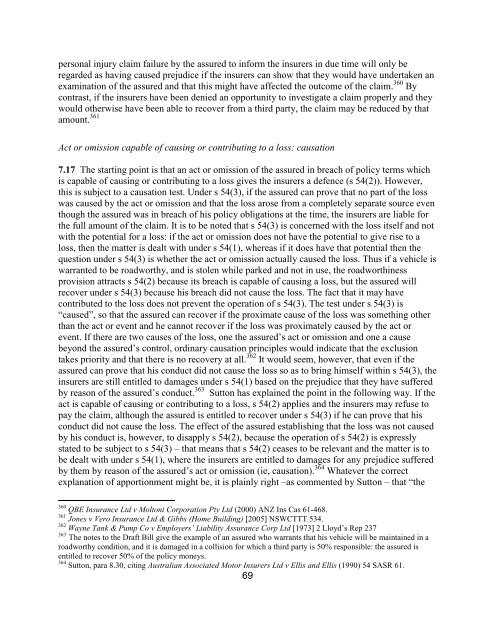REFORMING INSURANCE LAW: - Law Commission
REFORMING INSURANCE LAW: - Law Commission
REFORMING INSURANCE LAW: - Law Commission
You also want an ePaper? Increase the reach of your titles
YUMPU automatically turns print PDFs into web optimized ePapers that Google loves.
personal injury claim failure by the assured to inform the insurers in due time will only be<br />
regarded as having caused prejudice if the insurers can show that they would have undertaken an<br />
examination of the assured and that this might have affected the outcome of the claim. 360 By<br />
contrast, if the insurers have been denied an opportunity to investigate a claim properly and they<br />
would otherwise have been able to recover from a third party, the claim may be reduced by that<br />
amount. 361<br />
Act or omission capable of causing or contributing to a loss: causation<br />
7.17 The starting point is that an act or omission of the assured in breach of policy terms which<br />
is capable of causing or contributing to a loss gives the insurers a defence (s 54(2)). However,<br />
this is subject to a causation test. Under s 54(3), if the assured can prove that no part of the loss<br />
was caused by the act or omission and that the loss arose from a completely separate source even<br />
though the assured was in breach of his policy obligations at the time, the insurers are liable for<br />
the full amount of the claim. It is to be noted that s 54(3) is concerned with the loss itself and not<br />
with the potential for a loss: if the act or omission does not have the potential to give rise to a<br />
loss, then the matter is dealt with under s 54(1), whereas if it does have that potential then the<br />
question under s 54(3) is whether the act or omission actually caused the loss. Thus if a vehicle is<br />
warranted to be roadworthy, and is stolen while parked and not in use, the roadworthiness<br />
provision attracts s 54(2) because its breach is capable of causing a loss, but the assured will<br />
recover under s 54(3) because his breach did not cause the loss. The fact that it may have<br />
contributed to the loss does not prevent the operation of s 54(3). The test under s 54(3) is<br />
“caused”, so that the assured can recover if the proximate cause of the loss was something other<br />
than the act or event and he cannot recover if the loss was proximately caused by the act or<br />
event. If there are two causes of the loss, one the assured’s act or omission and one a cause<br />
beyond the assured’s control, ordinary causation principles would indicate that the exclusion<br />
takes priority and that there is no recovery at all. 362 It would seem, however, that even if the<br />
assured can prove that his conduct did not cause the loss so as to bring himself within s 54(3), the<br />
insurers are still entitled to damages under s 54(1) based on the prejudice that they have suffered<br />
by reason of the assured’s conduct. 363 Sutton has explained the point in the following way. If the<br />
act is capable of causing or contributing to a loss, s 54(2) applies and the insurers may refuse to<br />
pay the claim, although the assured is entitled to recover under s 54(3) if he can prove that his<br />
conduct did not cause the loss. The effect of the assured establishing that the loss was not caused<br />
by his conduct is, however, to disapply s 54(2), because the operation of s 54(2) is expressly<br />
stated to be subject to s 54(3) – that means that s 54(2) ceases to be relevant and the matter is to<br />
be dealt with under s 54(1), where the insurers are entitled to damages for any prejudice suffered<br />
by them by reason of the assured’s act or omission (ie, causation). 364 Whatever the correct<br />
explanation of apportionment might be, it is plainly right –as commented by Sutton – that “the<br />
360 QBE Insurance Ltd v Moltoni Corporation Pty Ltd (2000) ANZ Ins Cas 61-468.<br />
361 Jones v Vero Insurance Ltd & Gibbs (Home Building) [2005] NSWCTTT 534.<br />
362 Wayne Tank & Pump Co v Employers’ Liability Assurance Corp Ltd [1973] 2 Lloyd’s Rep 237<br />
363 The notes to the Draft Bill give the example of an assured who warrants that his vehicle will be maintained in a<br />
roadworthy condition, and it is damaged in a collision for which a third party is 50% responsible: the assured is<br />
entitled to recover 50% of the policy moneys.<br />
364 Sutton, para 8.30, citing Australian Associated Motor Insurers Ltd v Ellis and Ellis (1990) 54 SASR 61.<br />
69

















